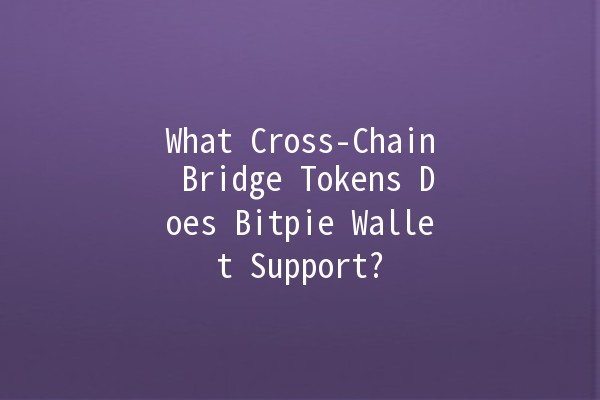
In the world of cryptocurrencies, the ability to transfer assets across different blockchain networks—commonly referred to as "crosschain transfers"—has become crucial for users looking to maximize their portfolios and streamline their transactions. Among the myriad of wallets available, Bitpie Wallet is known for its comprehensive support for various cryptocurrencies and crosschain functionalities. In this article, we will discuss which crosschain bridge tokens are supported by Bitpie Wallet, alongside practical productivity tips for effectively using this wallet to enhance your cryptocurrency experience.
Understanding Bitpie Wallet

Bitpie Wallet is a versatile cryptocurrency wallet designed for both seasoned traders and newcomers. It focuses on security, ease of use, and comprehensive asset management. The wallet supports an array of cryptographic assets, allowing users to manage their portfolios effectively. Also, the wallet emphasizes crosschain compatibility, which is essential given the growing number of blockchains.
Features of Bitpie Wallet
What Are CrossChain Bridge Tokens?
Crosschain bridge tokens enable the transfer of assets across different blockchain ecosystems. These tokens play a vital role in enhancing liquidity and enabling decentralized finance (DeFi) applications. They allow users to access capabilities from multiple blockchain networks, which can often lead to better trading opportunities and investment strategies.
How Do CrossChain Bridges Work?
Crosschain bridges usually work via a twostep mechanism involving lock and mint processes. In essence, when you want to transfer a token from one blockchain to another, the original token is locked in a smart contract, and a corresponding token is minted on the target blockchain. This process ensures that the total supply remains constant while allowing users to utilize their assets on different platforms.
Supported CrossChain Bridge Tokens on Bitpie Wallet
Bitpie Wallet supports a variety of crosschain bridge tokens, making it flexible for users who participate in various blockchain networks. Notable tokens include:
Tips for Enhancing Productivity in Using Bitpie Wallet
To get the most out of Bitpie Wallet and your cryptocurrency investments, consider the following productivity enhancement techniques:
Description: Regularly categorize your assets into sections based on liquidity, trading strategy, or other personal metrics.
Application Example: If you hold multiple cryptocurrencies, use tags or folders within Bitpie to categorize them. This way, you can easily identify your shortterm investment assets versus longterm hold assets, allowing for quicker decisions during market fluctuations.
Description: Leverage price alert features (when available) to remain informed about market conditions.
Application Example: If Bitpie Wallet offers price alert notifications, set alerts for significant tokens in your portfolio. Receiving timely alerts can enable you to act quickly when market conditions favor your trading strategy.
Description: Take advantage of crosschain capabilities by exploring various decentralized platforms.
Application Example: After transferring WBTC to Ethereum, consider utilizing it in DeFi platforms like Uniswap or Compound for yield farming or liquidity provisioning to maximize your investment potential.
Description: Use the Bitpie mobile app for onthego transactions and tracking.
Application Example: Download the Bitpie app on your smartphone. With the app, you can monitor your portfolio, execute trades and receive alerts on market changes, ensuring you never miss an opportunity, even when away from the computer.
Description: Regularly check for wallet updates or features that improve transaction capabilities or security.
Application Example: Follow Bitpie’s official communications or social media to stay alert about updates that may include new token support or improved functionalities relevant to your usage.
Common Questions About CrossChain Bridge Tokens and Bitpie Wallet
Q1: How do I transfer tokens between blockchains using Bitpie Wallet?
Answer: Transferring tokens between blockchains involves navigating to the crosschain feature of the Bitpie Wallet. Select the token you wish to transfer, choose the target blockchain, specify the amount, and confirm the transaction. The process will lock your tokens on the originating blockchain and mint the corresponding tokens on the target blockchain. Always ensure to check transaction fees beforehand, as crosschain transfers may incur additional costs.
Q2: What security measures does Bitpie Wallet have for crosschain transactions?
Answer: Bitpie Wallet places a strong emphasis on security. For crosschain transactions, tokens are typically locked in smart contracts, ensuring that all assets are safeguarded during transit. Additionally, the wallet features 2FA (twofactor authentication) and allows users to retain control over their private keys, minimizing the risk associated with centralized exchanges.
Q3: Are there fees associated with transferring crosschain bridge tokens?
Answer: Yes, transferring crosschain tokens usually incurs transaction fees. These fees can vary based on the blockchain networks involved and the amount being transferred. It’s crucial to review the fees associated with the transaction in Bitpie before proceeding, as costs can fluctuate based on network congestion.
Q4: Can I stake crosschain tokens using Bitpie Wallet?
Answer: Staking capabilities depend on the tokens and networks involved. While some tokens in Bitpie Wallet can be staked to earn rewards (e.g., MATIC), others may not support staking directly through the wallet interface. Always check if the specific token has options available to stake on decentralized platforms or affiliated services.
Q5: How can I keep my wallet secure?
Answer: Security is paramount when dealing with cryptocurrencies. To ensure your Bitpie Wallet is secure, always enable twofactor authentication, use unique passwords, and regularly back up your wallet information. Keep your private keys offline and be wary of phishing scams that may attempt to steal your credentials.
Q6: What should I do if I encounter problems during a crosschain transaction?
Answer: If you experience issues during a crosschain transaction, the first step is to check your internet connection and ensure you have sufficient tokens to cover transaction fees. If the problem persists, consult the Bitpie support documentation and FAQs for troubleshooting steps. You may also contact customer support for direct assistance if needed.
By understanding the crosschain bridge tokens supported by Bitpie Wallet and leveraging the practical tips provided, users can enhance their cryptocurrency experience significantly while ensuring their investments are secure and optimized for efficiency.

